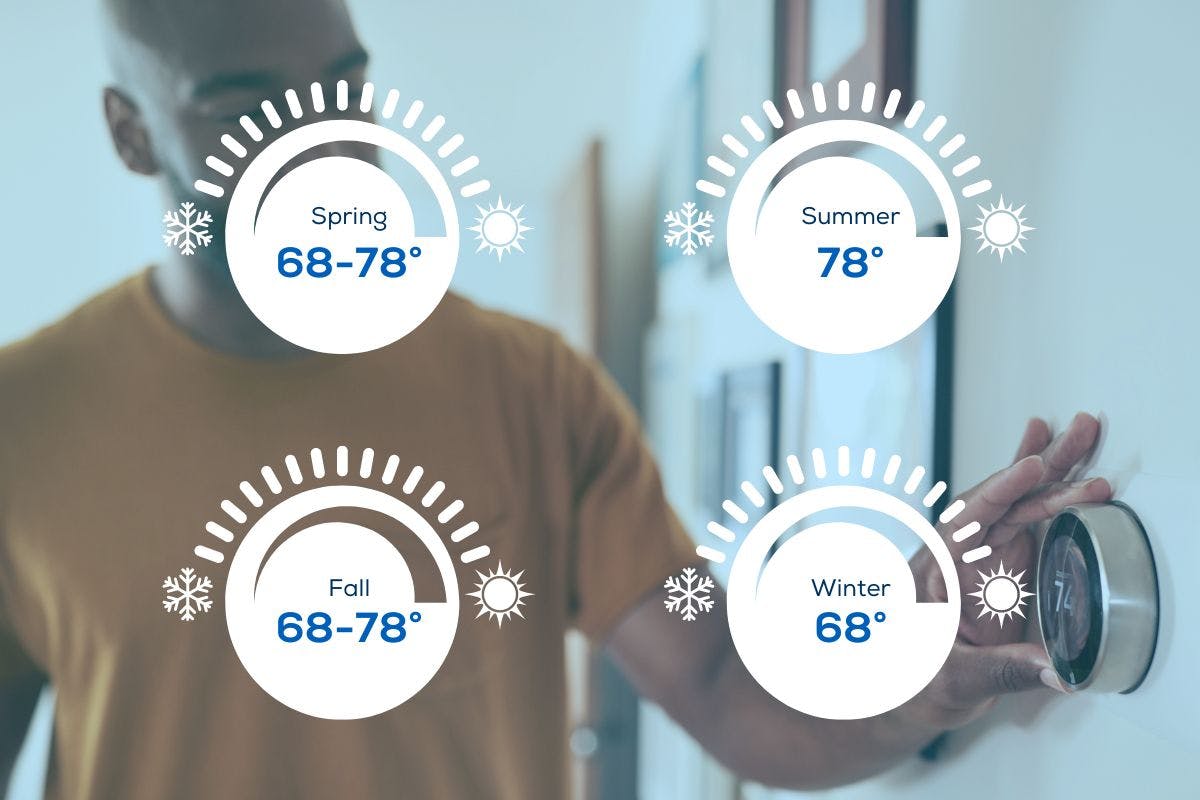If you’re noticing a higher electric bill in recent months, you’re not alone. The reasons may span from geopolitical affairs to your light bulbs. The average price of electricity in the U.S. has risen about 21% in the last three years, from 13.7 cents per kilowatt-hour in 2021 to 16.6 cents as of July 2024.
Your electric bill may be higher for a number of reasons. Your daily schedule, your appliances, the age of the home, insulation, phantom power, how you use hot water, and peak or non-peak energy rates, are just some. There are ways to save on energy. We’ll look at quick, simple tips on up to bigger projects — like going solar — in this article.
See how much you can save with home energy changes
What Can Cause a High Electricity Bill?
A higher electric bill could simply be a result of a higher rate from the utility company. It could be from changes in your home or life. Or, it could just be the weather.
Changes in weather
It’s summer in the deep south. You’re using more AC. It’s winter in Minnesota. You need more heat. Your power bills are probably up every year in the same months.
If it increases, check to see if your bill is up as it normally is compared to a year ago. If it’s abnormally high, it could be warmer or colder than usual for your region.
Electricity is more expensive
Sometimes electricity just gets more expensive. If the rate from your utility is higher, you might think there’s nothing you can do. Learning more about time-of-use rates, and their peak vs. off-peak hours, may show you how to do some tasks at less expensive times.

Changes in usage
This is one you may not think about until you see it in numbers on a bill. Are you staying home more or working from home? Are more people home for the holidays or summer break?
Changes in routine can increase how much electricity you’re using. If more people are home for more hours of the day, it means more devices, more cooking, more showers, more laundry, and so on. A few cents multiplied over and over again could add up.
You could get surprisingly higher electric bills in November and December, maybe from having very nice holidays, with family, friends, and food at home. Here are a few extra ideas and tips.
Leaving devices on
This is another place where a few cents can add up over time.. Video game consoles, TVs and other devices can still use phantom or vampire power for hours at a time when they’re in standby. Unplugging them can add up to a lot of saved energy.
Are you going to unplug everything when not using it? No.
Plugging multiple devices into power strips, then turning off the power strip, can eliminate standby power. Smart plugs and switches can also help.
Hot water usage
Showers, laundry, and the dishwasher will work just fine if you turn your water heater down to 120 degrees. For every 10 degrees you drop the water heater, you’ll save 3-5% on the energy cost of the water heater. Insulating water pipes and using a water heater insulation blanket usually saves energy and money.
An electric water heater is another potential energy efficient improvement. Electric water heaters come in conventional, tankless, heat pump, and solar types.
With laundry, you can be more selective about running hot cycles when cold cycles will get the job done. Running full loads and cleaning the lint trap as often as recommended can also save you energy.
Old, inefficient appliances
Older appliances around the home might have never been energy efficient, especially by current standards, or could be losing efficiency with age. For an example, a refrigerator from 20 years ago uses 35% more energy than a current Energy-Star certified refrigerator. Your dishwasher or washing machine/dryer may need to run twice to get a load clean or dry.
New electric appliances and EVs
We just said get new, efficient appliances. Now we’re saying new appliances could lead to a higher electric bill? In some instances, this is true.
If you toss an old gas stove for a new electric stove, your gas bill will drop and the electric bill will tick up. Hopefully this swap is still a net positive, for the new stove and the net utility cost.
If you’ve just bought an electric vehicle for the first time, congrats! One expected trade-off is, you’ll use more electricity. Your electric bill might go up, even if your overall cost of owning a vehicle is likely to be lower. For more on getting the most out of your EV, cost effectively charging the EV, how a home EV charger and solar power might be a compatible answer for you, see our guide here.
Poor insulation and a leaky house
The US Department of Energy estimates 9 of 10 homes in the US are not insulated or are under-insulated. With the right level of insulation, homeowners would save about 11% on their total electric bill. Insulation stops air leaks, keeping in heat in the winter and cool in the summer.
You can do your own energy audit, or hire a pro to check what insulation you have and should have in your attic, basement and/or crawl space. The right insulation also protects a home from humidity, pollen, and dust.
See how much you can save by going solar with Palmetto
How Can I Save on My Energy Bill?
There are ways to save on your energy bill. From quick, easy things to increasing your independence from the utility company and switching to a home solar system.
Energy audit
An energy audit, or home energy assessment, checks a home’s energy efficiency. It can be done professionally, sometimes via your utility company, or as a DIY job. In North Carolina, for example, Duke Energy offers an energy audit service. This guide for a do-it-yourself audit is a helpful starting point.
The main idea is to check for areas where air can draft in or out. You want to check the foundation, walls, siding, chimney, the attic, caulking, weather-stripping, window and door frames, and even small openings or cracks such as cable lines or outlets or laundry vents. In old homes, maybe even mail slots or laundry chutes could be letting energy be wasted.
From our guide to energy audits, the components and categories of a full energy audit are:
- Insulation check: The auditor will examine the insulation levels in the walls, basements, and attics.
- Blower door test: This test measures air leaks and drafts in the home and identifies areas that need to be sealed.
- Thermographic scanning: This scan effectively identifies whether heat is lost through the walls, doors, or windows.
- HVAC system: This involves inspecting the efficiency of the heating and cooling systems, including the ductwork and air delivery systems.
- Lighting evaluation: Checking light fixtures and the types of bulbs to ensure you are using the most energy efficient solutions available.
- Appliances check: Ensuring that the appliances are working correctly and everything meets energy efficiency standards.
- Utility bill review: The auditor can review your utility bills to identify patterns that indicate unusually high energy usage.
Install a smart thermostat and other smart devices
Smart thermostats, along with smart dishwashers, smart TVs, smart vacuums, might be good adds for energy efficiency and easier everyday life. Thermostats can be the biggest energy bill saver as it will help you run heating and cooling in the most efficient way.
Smart home thermostats can “learn” the settings for your heating and cooling in real-time and manage those settings in the most energy-efficient way possible. It can adjust temperatures for optimal performance, or you can from an app. The “smart” in smart thermostat can refer to the AI ability to learn your usage patterns, and automatically make adjustments to those patterns, or it can just mean “app-connected.”
Smart plugs and vampire energy
If you don’t want new thermostats or devices, or to rely on the AI, you can use smart plugs on devices to turn them on or off with an app, or monitor the electricity usage. Safety, say turning off an iron or the stove, is another positive to smart plugs.
With smart plugs, it may be simpler to control or program everything to shut down and not use vampire energy when no one’s home or everyone’s asleep.
Adjust your thermostat and use a ceiling fan
If you have ceiling fans, they can be used for home comfort and HVAC efficiency. Ceiling fans don’t actually change the temperature inside, they simply make it feel cooler or warmer by up to four degrees.
We typically use ceiling fans to make a room feel cooler, but you can use ceiling fans year-round. In the cooler months, you can reverse the fan and move warmer air down (heat rises, as you might know from elementary school science) so it feels warmer where you are.
One note on energy efficiency though, leaving a fan on when no one is in the room is a waste of energy since no one is there to feel its effects.
Improve your insulation
Adding or having insulation can cut your energy bill and improve the comfort and health inside your house.
This might mean you have to install insulation in the first place. It could be you need to check insulation levels and coverage and add to it. It could be you need to check other parts of the envelope of your house and address leaks there.

Credit US Environmental Protection Agency
Change your HVAC filters
Energy efficiency is only one reason to remember to change the air filters in your HVAC system every 1-3 months. The easier air circulates through vents, ducts, and a whole home, the more efficient an HVAC system runs.
Filters become dirty as they’re cleaning your home’s air. When they’re dirty though, they need to be replaced. The more your system runs, and the more pollen, dust and pet dander you have in your normal environment, inside and out, the closer to one month it should be.
A clogged filter makes the whole HVAC system work harder and use more energy. This can eventually lead to more maintenance or an earlier system replacement than you expected.
Energy efficient appliances, devices
When looking at new appliances, look for Energy Star approved ones or Energy Guide numbers and metrics on them.
Energy Star is a sign of a product meeting energy efficient standards set by the US Environmental Protection Agency. Energy Guide, a yellow label on an appliance, gives ratings and metrics such as estimated annual energy cost.
Water heaters, HVAC systems, heat pumps, EV chargers, dishwashers, washers and dryers, refrigerators and freezers, TVs, and thermostats (consider upgrading to smart thermostats) are some of the appliances with Energy Star lists. Some Energy Star, electrical, and/or smart appliances may qualify for tax credits or rebates.
Changing light bulbs can be an energy-saving step. Energy Star-certified LED bulbs use about 90% less energy than standard bulbs so each bulb can save about $55 in electricity in its lifespan, which is about 15 times longer than a standard bulb. An LED bulb also puts out about 70-90% less heat, so using LED bulbs in more places can make a small difference in how much your AC runs.
According to the US Environmental Protection Agency, if every home in the US replaced one standard light bulb with an LED, Energy Star bulb, it would prevent seven billion pounds of greenhouse gas emissions a year, the same amount as about 690,000 cars, and it would collectively save about $580 million in power costs.
Install solar panels
With solar power for your home, you can generate your own green, 100% renewable energy. You can partially, largely, or entirely avoid electricity from your utility. You can reduce your electric bills, increase your energy independence, and help the environment. With the expertise of Palmetto’s team, you can maximize the savings from a new system.
If you’re interested in learning more about home solar power and seeing if a journey toward cleaner, less expensive energy is right for you, go to Palmetto’s solar savings calculator or use our contact form.
Adjust your habits
We get it, how often does your “normal” day really go according to plan? It might feel too complicated to change your habits just to save energy. The key is finding the habits that work for you.
It pays to know if you have time-of-use or peak/off-peak rates in your state or area. Then, if you can move some of your energy-heavy jobs to the off-peak periods, you’ll save. It’s not always possible, but scheduling loads of laundry or the dishwasher or letting a smart thermostat adjust for energy savings may mean you use less power during peak or super-peak hours.
Solar and storage can be a good fit for time-of-use rates. Solar systems generate maximum electricity during mid-days and afternoons. Peak or super-peak rates are most often in the late afternoon and evening, when people tend to get home and use the most electricity. If you have a battery, you can store solar energy and use it instead of the utility company’s peak-rate energy.
Remembering to turn off lights and devices, or putting them on a schedule, may be an easy way to cut back on electricity too.
Solar is a solution in areas without time-of-use rates, too. Generating your own electricity can help lower your electric bill whether it’s going up because your electric rates have increased, your using more energy, the weather is changing, or something else.
See what solar can do for you:
Energy Bill Savings FAQs
How can I easily lower my electricity bill?
Some easy ways to cut your electric bill include checking your home’s insulation, making sure filters are clean and basic maintenance on your HVAC is up to date, shifting when you use power, lowering the temperature of your water heater, and trying new light bulbs.
Will solar panels eliminate my electricity bill?
No, solar panels often do not eliminate your electricity bill. You may be able to use no power from the utility company, you may still have to pay certain fees and charges from the utility. Policies vary, so be sure to check with your utility and solar advisor
What are the biggest uses of energy in a house?
A home’s HVAC is, by a large margin, the largest user of energy, totaling about 45% of the total energy consumption. From there, the list includes your water heater, lighting, refrigerator/freezer, and washing machine/dryer.
 Andrew GiermakWriter and Editor
Andrew GiermakWriter and EditorAndrew joined Palmetto in Charlotte in August 2024. He’s been a writer in journalism, then in business, going back to almost the 20th century. He’s lived in Indiana, Virginia, Pennsylvania, Virginia again, and now North Carolina for the last 12 years. He likes golf. Is he good at it? Not so much.



